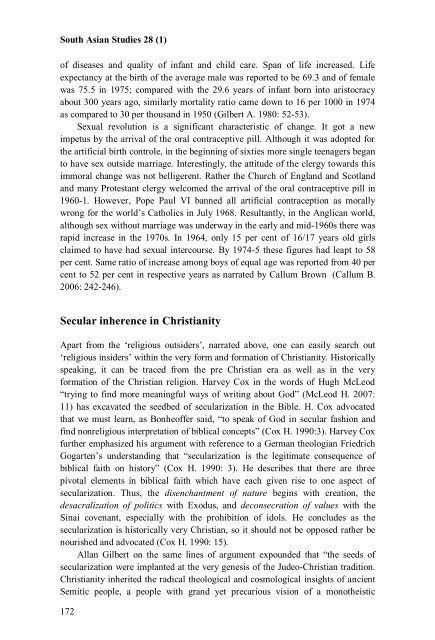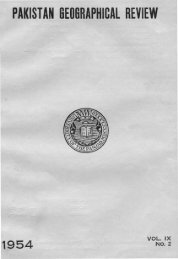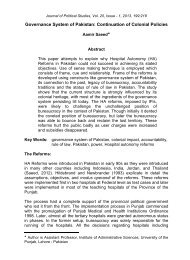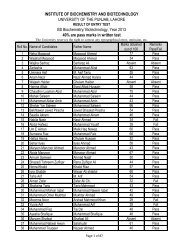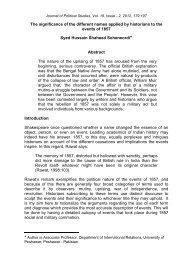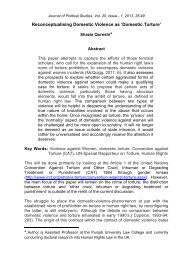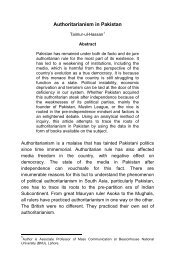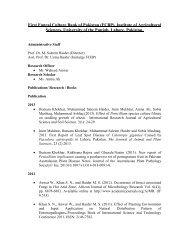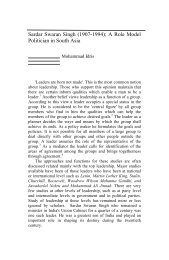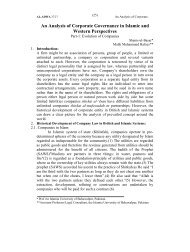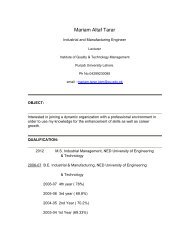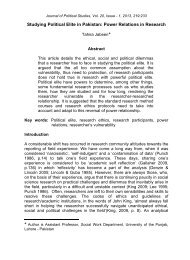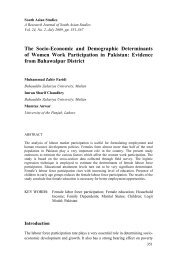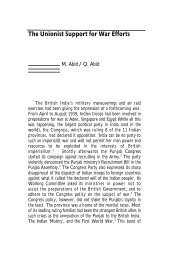Can Pakistan be a Secular State? - University of the Punjab
Can Pakistan be a Secular State? - University of the Punjab
Can Pakistan be a Secular State? - University of the Punjab
Create successful ePaper yourself
Turn your PDF publications into a flip-book with our unique Google optimized e-Paper software.
South Asian Studies 28 (1)<br />
<strong>of</strong> diseases and quality <strong>of</strong> infant and child care. Span <strong>of</strong> life increased. Life<br />
expectancy at <strong>the</strong> birth <strong>of</strong> <strong>the</strong> average male was reported to <strong>be</strong> 69.3 and <strong>of</strong> female<br />
was 75.5 in 1975; compared with <strong>the</strong> 29.6 years <strong>of</strong> infant born into aristocracy<br />
about 300 years ago, similarly mortality ratio came down to 16 per 1000 in 1974<br />
as compared to 30 per thousand in 1950 (Gil<strong>be</strong>rt A. 1980: 52-53).<br />
Sexual revolution is a significant characteristic <strong>of</strong> change. It got a new<br />
impetus by <strong>the</strong> arrival <strong>of</strong> <strong>the</strong> oral contraceptive pill. Although it was adopted for<br />
<strong>the</strong> artificial birth controle, in <strong>the</strong> <strong>be</strong>ginning <strong>of</strong> sixties more single teenagers <strong>be</strong>gan<br />
to have sex outside marriage. Interestingly, <strong>the</strong> attitude <strong>of</strong> <strong>the</strong> clergy towards this<br />
immoral change was not <strong>be</strong>lligerent. Ra<strong>the</strong>r <strong>the</strong> Church <strong>of</strong> England and Scotland<br />
and many Protestant clergy welcomed <strong>the</strong> arrival <strong>of</strong> <strong>the</strong> oral contraceptive pill in<br />
1960-1. However, Pope Paul VI banned all artificial contraception as morally<br />
wrong for <strong>the</strong> world’s Catholics in July 1968. Resultantly, in <strong>the</strong> Anglican world,<br />
although sex without marriage was underway in <strong>the</strong> early and mid-1960s <strong>the</strong>re was<br />
rapid increase in <strong>the</strong> 1970s. In 1964, only 15 per cent <strong>of</strong> 16/17 years old girls<br />
claimed to have had sexual intercourse. By 1974-5 <strong>the</strong>se figures had leapt to 58<br />
per cent. Same ratio <strong>of</strong> increase among boys <strong>of</strong> equal age was reported from 40 per<br />
cent to 52 per cent in respective years as narrated by Callum Brown (Callum B.<br />
2006: 242-246).<br />
<strong>Secular</strong> inherence in Christianity<br />
Apart from <strong>the</strong> ‘religious outsiders’, narrated above, one can easily search out<br />
‘religious insiders’ within <strong>the</strong> very form and formation <strong>of</strong> Christianity. Historically<br />
speaking, it can <strong>be</strong> traced from <strong>the</strong> pre Christian era as well as in <strong>the</strong> very<br />
formation <strong>of</strong> <strong>the</strong> Christian religion. Harvey Cox in <strong>the</strong> words <strong>of</strong> Hugh McLeod<br />
“trying to find more meaningful ways <strong>of</strong> writing about God” (McLeod H. 2007:<br />
11) has excavated <strong>the</strong> seed<strong>be</strong>d <strong>of</strong> secularization in <strong>the</strong> Bible. H. Cox advocated<br />
that we must learn, as Bonhe<strong>of</strong>fer said, “to speak <strong>of</strong> God in secular fashion and<br />
find nonreligious interpretation <strong>of</strong> biblical concepts” (Cox H. 1990:3). Harvey Cox<br />
fur<strong>the</strong>r emphasized his argument with reference to a German <strong>the</strong>ologian Friedrich<br />
Gogarten’s understanding that “secularization is <strong>the</strong> legitimate consequence <strong>of</strong><br />
biblical faith on history” (Cox H. 1990: 3). He descri<strong>be</strong>s that <strong>the</strong>re are three<br />
pivotal elements in biblical faith which have each given rise to one aspect <strong>of</strong><br />
secularization. Thus, <strong>the</strong> disenchantment <strong>of</strong> nature <strong>be</strong>gins with creation, <strong>the</strong><br />
desacralization <strong>of</strong> politics with Exodus, and deconsecration <strong>of</strong> values with <strong>the</strong><br />
Sinai covenant, especially with <strong>the</strong> prohibition <strong>of</strong> idols. He concludes as <strong>the</strong><br />
secularization is historically very Christian, so it should not <strong>be</strong> opposed ra<strong>the</strong>r <strong>be</strong><br />
nourished and advocated (Cox H. 1990: 15).<br />
Allan Gil<strong>be</strong>rt on <strong>the</strong> same lines <strong>of</strong> argument expounded that “<strong>the</strong> seeds <strong>of</strong><br />
secularization were implanted at <strong>the</strong> very genesis <strong>of</strong> <strong>the</strong> Judeo-Christian tradition.<br />
Christianity inherited <strong>the</strong> radical <strong>the</strong>ological and cosmological insights <strong>of</strong> ancient<br />
Semitic people, a people with grand yet precarious vision <strong>of</strong> a mono<strong>the</strong>istic<br />
172


